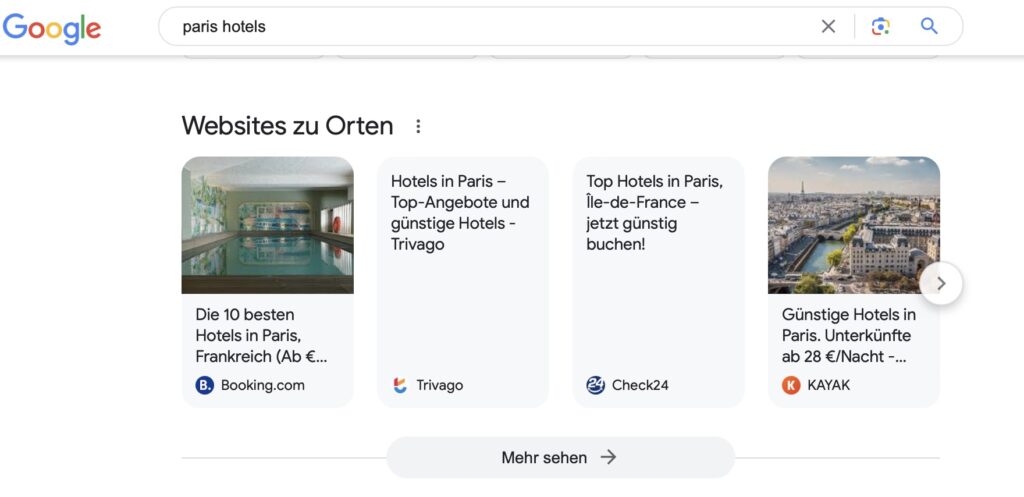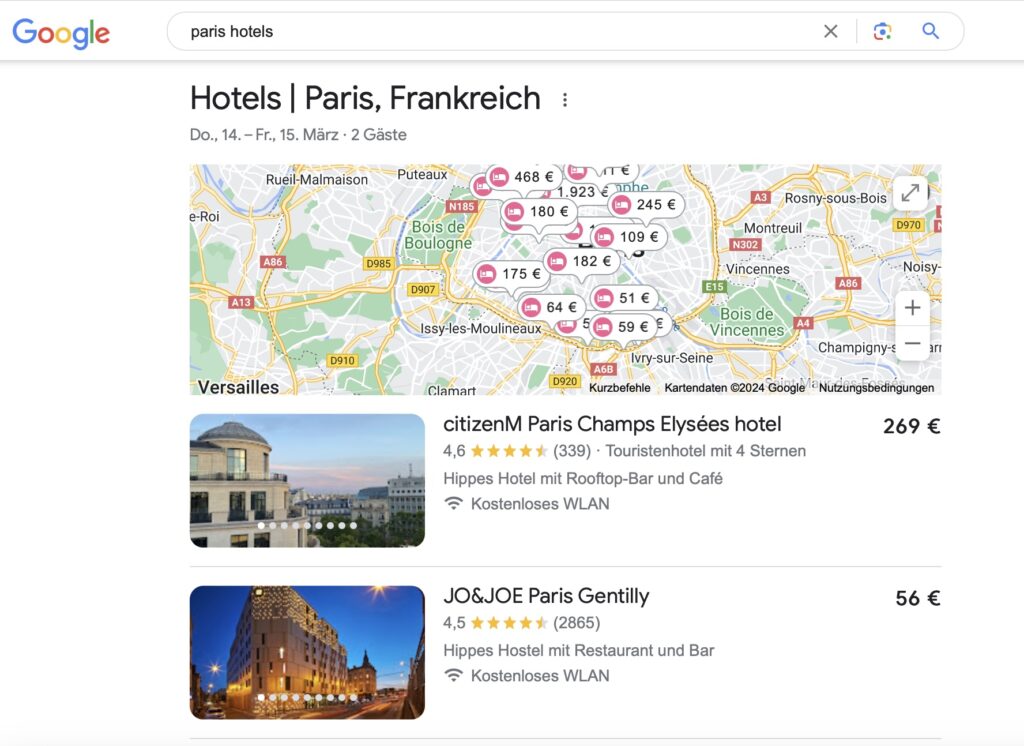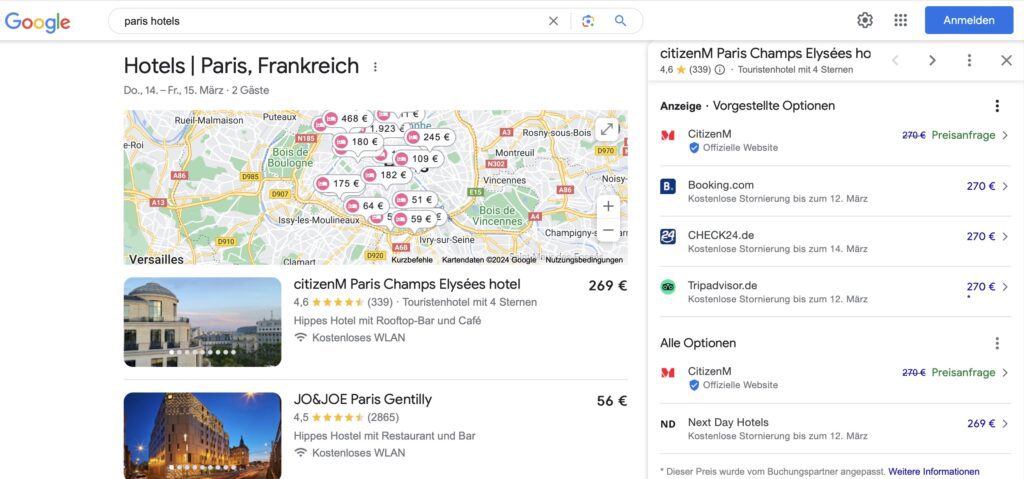Skift Take
— Dennis Schaal
The European Union’s Digital Markets Act, designed to ensure fair competition and protect consumers, became effective Thursday, and the EU Travel Tech association claimed Google is not complying with the new law.
EU Travel Tech members include Airbnb, Amadeus, Booking.com, eDreams Odigeo, Expedia Group, Skyscanner and Travelport.
“Google continues to self-preference its own intermediation services on the Search Engine Results Page (SERP),” the group wrote in a letter Wednesday to Margrethe Vestager, the commission’s antitrust czar, and Thierry Breton, commissioner for Internal Market, European Commission.
The group claims in the letter that Google’s own products for hotels, flights and other travel services are “more prominent, interactive and rich” than competitors’ products. “Organic search results are moving further away from view, while the page is filled with Google-owned content. This leads to a poorer experience and less choice for users.”
Google has changed the way it displays search results in Europe in recent months to meet the new law’s requirements, but the trade group said it falls short.
EU Travel Tech demanded that Google propose new ways to show search results and urged the European Commission to begin an investigation if Google flouts the law.
The Digital Markets Act
Under the Digital Markets Act, the European Commission designated several platforms as “gatekeepers,” including Alphabet, parent company of Google; Amazon; Apple; ByteDance; Meta, and Microsoft. The commission has required them to change their business practices. Booking.com expects to be assigned gatekeeper status later this year.
Competitors such as Tripadvisor and Expedia have long accused Google both in Europe and the U.S. of favoring its own travel businesses over those of rivals.
Google counters that its products are in consumers’ best interests because Google is efficiently giving them the answers they want. (This was before ChatGPT began to give consumers at times smarter answers, but that’s a separate issue.)
The following screenshots of Google.de in Germany show the new way Google is displaying hotel search results in the European Union – an example of why EU Travel Tech thinks Google is still biasing search results in favor of Google’s own travel businesses.
In this first screenshot, Google displays photos and offers free website links to rivals Booking.com, Trivago, Check24, and Kayak after a search for “paris hotels.” These links don’t automatically appear in the U.S.

In the second screenshot (below), you’ll notice the much more prominent treatment Google gives to the Google Hotels ecosystem, where the search engine makes tons of money from online travel agency advertisers.
The interactive map, which enables travelers to click on a hotel rate and navigate into the Google Hotels storefront, is much larger than the treatment Google gives to its rivals in the first screenshot. So are the photos of CitizenM Paris, Joe&Joe Paris Gentilly, and the People Paris Marais (which is out of view).
The listings for these three hotels are more informational and design-friendly than for competitor listings. Google says listings like the CitizenM Paris are generated organically, and aren’t advertiser-driven. But when you click on one of these hotel listings, you navigate to the Google Hotels business.

After clicking on the CitizenM listing in the screenshot (above), a new Google Hotels block opens within the search results page to the right of the map. In the U.S., you would navigate to a different Google Hotels page, but this one in the European Union is more seamless since you don’t have to leave the page. You’ll see a link to the CitizenM official hotel website with no rate shown, and then you’ll view advertisements with hotel rates from Booking.com, Check24.de and Tripadvisor.de. Below the advertisements are free links.

The argument that EU Travel Tech and others make is that consumers are much more apt to click on the Google Hotels listings.
Google’s Response
In response to the EU Travel Tech letter, a Google spokesperson said Thursday it has made big changes to the way it displays search results, and it is trying to balance the interests of consumers, hotels and airlines, as well as competitors.
“The changes to the Search results page that we outlined recently are significant — including the introduction of dedicated units for comparison services,” a Google spokesperson said. “We have also removed other units, even though consumers found them useful. We’ve been seeking feedback from a range of stakeholders over many months, and in over a dozen stakeholder events, as we try to balance the needs of different stakeholders while complying with the law. That includes not just aggregators but the direct suppliers like hotels, merchants and airlines.”
Google said since making the changes it has seen a significant uptick in free clicks to online travel agency and metasearch company pages, and that hotels, airlines and restaurants will see a significant falloff of traffic from people who are ready to book.
Two French senators reportedly told the European Commission that Google’s changes will harm hotels seeking direct bookings. Hotel industry advocates likewise warned that the increased prominence given to online travel agencies and metasearch engines in Google’s search results will negatively impact hotel businesses.
Photo Credit: Google headquarters in Mountain View, California, as seen in 2016. Source: The Pancake of Heaven!, CC BY-SA 4.0 , via Wikimedia Commons

